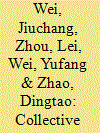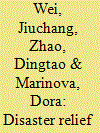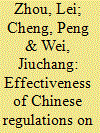|
|
|
Sort Order |
|
|
|
Items / Page
|
|
|
|
|
|
|
| Srl | Item |
| 1 |
ID:
131644


|
|
|
|
|
| Publication |
2014.
|
| Summary/Abstract |
Mass incidents are inevitable in contemporary China and the first thing we should learn is to adopt a correct attitude towards them. Based on the three elements-activity, interaction and sentiment-of collective behaviors in 52 mass incidents in China during 2007-2011, we find that collective behaviors in mass incidents show significant differences in activity, interaction and sentiment. A grade evaluation method is proposed to estimate the evolution of collective behaviors in 52 mass incidents and to classify such behaviors into five grades. Then the influence factors on the three elements are analyzed using multiple linear regression. The regression results demonstrate that the impacts of location, casualties, inner-group relations, group scale and duration on the three elements are very significant. Finally, in the light of the regression results, some implications of collective behavior in mass incidents are proposed for the relevant authorities in responding to mass incidents.
|
|
|
|
|
|
|
|
|
|
|
|
|
|
|
|
| 2 |
ID:
124663


|
|
|
|
|
| Publication |
2013.
|
| Summary/Abstract |
The United States and China, as the largest developed country and the largest developing country in the world, respectively, have their own overt and covert influences on the world. This article discusses the foreign responses when the US was hit by the catastrophic Hurricane Katrina in 2005 and China by the Wenchuan earthquake in 2008. By using a three-stage process to describe disaster aid decisions, it was found that developed countries were more likely to grant disaster aid, but the scale of their assistance was not the largest. Evidence showed that countries were more likely to offer assistance if they were geographically located closer to the affected areas but this was not the case in decisions made on the type and amount of aid provided. Assistance from European countries, on the other hand, largely showed a form of cosmopolitan humanitarianism
|
|
|
|
|
|
|
|
|
|
|
|
|
|
|
|
| 3 |
ID:
149312


|
|
|
|
|
| Summary/Abstract |
To assess the effectiveness of Chinese regulations on occupational health and safety, this study provides an exploratory method by applying multiple interrupted time series (MITS) analysis. Taking coal mine safety in China as a case study, this article analyzes the background of the coal industry, especially during the period 1980–2009, and selects three typical pieces of national legislation specific to mining and work safety as the interventions. The data relevant to coal mine safety and the ‘third variables’ were collected to empirically support the study. The estimated results indicate different effects of these interventions on state-owned enterprise (SOE) mines and township and village enterprise (TVE) or small mines. Specifically, though the mortality rate in SOE mines is on a downward trend, these interventions have had no significant effect on it. However, only the 2002 act significantly reduced the mortality rate per million tons in TVE mines. The effectiveness of the interventions seems to depend on certain conditions, such as technology, administration and socioeconomic environment and type of coal mine.
|
|
|
|
|
|
|
|
|
|
|
|
|
|
|
|
|
|
|
|
|